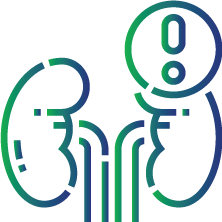
Protein Creatinine Ratio, Spot Urine Test
Protein Creatinine Ratio, Spot Urine Test
The Protein Creatinine Ratio (PCR) in a spot urine test is a simple and effective method to estimate the amount of protein excreted in urine. This test is commonly used to assess kidney function and detect proteinuria, a condition characterized by excessive protein in the urine, which may indicate kidney disease or other systemic conditions.
What is the Protein Creatinine Ratio Test Used For?
The Protein Creatinine Ratio test is primarily used to:
- Detect and Monitor Kidney Disease: Identifies and monitors conditions such as chronic kidney disease (CKD), diabetic nephropathy, or glomerulonephritis.
- Evaluate Proteinuria: Quantifies protein loss in urine, aiding in the diagnosis of kidney or systemic disorders.
- Monitor Pregnant Women: Detects preeclampsia by identifying elevated protein levels in urine.
- Screen for Kidney Damage in High-Risk Groups: Assesses individuals with hypertension, diabetes, or a family history of kidney disease.
Symptoms Indicating the Need for the Test
Patients with kidney disorders have the following symptoms and such patients benefit from screening with the protein creatinine ratio spot urine test

Swelling (edema)

Fatigue

Foamy urine

High blood pressure
Who Should Get Tested?
Healthcare providers may advise patients with the following conditions to undergo a protein creatinine ratio spot urine test

Diabetes

Chronic kidney disease

Hypertension

Family history of kidney diseases

Autoimmune diseases

Pregnant women
Preparation for the Test
The Protein Creatinine Ratio test requires a random urine sample, and preparation is minimal. You can eat and drink normally before the test.
Avoid excessive fluid intake prior to sample collection to prevent dilution of the urine. Inform your healthcare provider about any medications or supplements you are taking, as they may influence test results.
Interpretation of Results
Results of the Protein Creatinine Ratio are expressed in milligrams of protein per gram of creatinine (mg/g). Key interpretations include:
- Normal Range: Less than 150 mg/g in adults and less than 200 mg/g in children.
- Mild Proteinuria: 150-500 mg/g, which may indicate early kidney disease or other conditions.
- Moderate to Severe Proteinuria: Greater than 500 mg/g, often associated with significant kidney damage or systemic diseases.
Note: Results should be interpreted in conjunction with other clinical findings and diagnostic tests, such as blood tests for kidney function or imaging studies.
FAQs
What does an elevated Protein Creatinine Ratio indicate?
An elevated PCR suggests increased protein excretion in urine, which may indicate kidney disease, diabetes, hypertension, or preeclampsia.
How is the PCR different from the 24-hour urine protein test?
The PCR provides a quick and convenient estimate of protein excretion using a single urine sample, while the 24-hour test measures total protein output over a full day.
Can medications affect the test results?
Yes, certain medications, such as nonsteroidal anti-inflammatory drugs (NSAIDs) or ACE inhibitors, may influence protein excretion and test results.
Is the PCR test accurate during pregnancy?
Yes, the PCR test is commonly used during pregnancy to monitor for preeclampsia and other conditions, but results should be interpreted carefully by a healthcare provider.
How often should the test be repeated?
The frequency of testing depends on the underlying condition being monitored. Your healthcare provider will recommend a schedule based on your specific needs.

